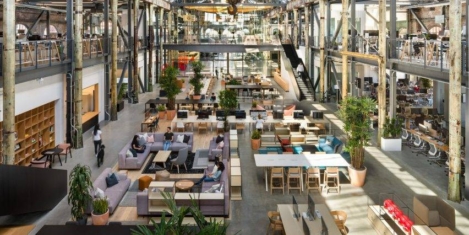To provide the best experiences, we use technologies like cookies to store and/or access device information. Consenting to these technologies will allow us to process data such as browsing behaviour or unique IDs on this site. Not consenting or withdrawing consent, may adversely affect certain features and functions.
The technical storage or access is strictly necessary for the legitimate purpose of enabling the use of a specific service explicitly requested by the subscriber or user, or for the sole purpose of carrying out the transmission of a communication over an electronic communications network.
The technical storage or access is necessary for the legitimate purpose of storing preferences that are not requested by the subscriber or user.
The technical storage or access that is used exclusively for statistical purposes.
The technical storage or access that is used exclusively for anonymous statistical purposes. Without a subpoena, voluntary compliance on the part of your Internet Service Provider, or additional records from a third party, information stored or retrieved for this purpose alone cannot usually be used to identify you.
The technical storage or access is required to create user profiles to send advertising, or to track the user on a website or across several websites for similar marketing purposes.
 A new report claims to have found a lack of commitment amongst UK businesses to address their impact on the environment and contribution to climate change, with only 10 percent having set a carbon reduction target, while just under half of companies (49 percent) use even the most basic sustainability measures, such as recycling bins for office waste.
A new report claims to have found a lack of commitment amongst UK businesses to address their impact on the environment and contribution to climate change, with only 10 percent having set a carbon reduction target, while just under half of companies (49 percent) use even the most basic sustainability measures, such as recycling bins for office waste.
















 A new task group spearheaded by the UK Green Building Council (UKGBC) being launched which will develop an industry-led definition for net zero carbon buildings. The task group brings together over thirty experts from across the building value chain and is being supported by 12 leading industry bodies. Following the recent IPCC report and the Paris Climate Agreement, worldwide attention has switched to achieving “net zero emissions” to escape the worst impacts of climate change. To answer this, a global campaign is being led by the World Green Building Council – calling for all new buildings to be net zero carbon in operation by 2030 and all existing buildings to achieve this standard by 2050. Its aim is to build industry consensus on a definition for net zero carbon buildings, which can then be used to advise project designs, planning requirements and building regulations.
A new task group spearheaded by the UK Green Building Council (UKGBC) being launched which will develop an industry-led definition for net zero carbon buildings. The task group brings together over thirty experts from across the building value chain and is being supported by 12 leading industry bodies. Following the recent IPCC report and the Paris Climate Agreement, worldwide attention has switched to achieving “net zero emissions” to escape the worst impacts of climate change. To answer this, a global campaign is being led by the World Green Building Council – calling for all new buildings to be net zero carbon in operation by 2030 and all existing buildings to achieve this standard by 2050. Its aim is to build industry consensus on a definition for net zero carbon buildings, which can then be used to advise project designs, planning requirements and building regulations.






 Generation Z, the latest generation to enter the workforce, are more likely to be motivated by job satisfaction and working for social good than by money, a new report claims According to new research from Huawei, in partnership with Chris Brauer, Director of Innovation at Goldsmiths, University of London, based on responses from 2,000 18-25-year olds’ across the UK, also reveals that a new tribe of working professionals among Gen Z is emerging, the ‘New Working Order’.
Generation Z, the latest generation to enter the workforce, are more likely to be motivated by job satisfaction and working for social good than by money, a new report claims According to new research from Huawei, in partnership with Chris Brauer, Director of Innovation at Goldsmiths, University of London, based on responses from 2,000 18-25-year olds’ across the UK, also reveals that a new tribe of working professionals among Gen Z is emerging, the ‘New Working Order’. 
 IT analyst Gartner has forecasted that by 2022 cloud will make up almost a third of IT spending, but only a quarter of SMEs are properly prepared for it, claims a new study. The Missed Middle study, commissioned by Crown Workspace, found that three quarters of UK SMEs are failing to embrace workplace technologies such as cloud, mobile working and digital devices. This could impact their business agility, security and financial efficiency. Cost is the most common barrier preventing SMEs from creating the optimum workspace that features modern technology. For instance voice technology has seen huge adoption over the past few years, however less than one in five respondents are ready for it in the workplace.
IT analyst Gartner has forecasted that by 2022 cloud will make up almost a third of IT spending, but only a quarter of SMEs are properly prepared for it, claims a new study. The Missed Middle study, commissioned by Crown Workspace, found that three quarters of UK SMEs are failing to embrace workplace technologies such as cloud, mobile working and digital devices. This could impact their business agility, security and financial efficiency. Cost is the most common barrier preventing SMEs from creating the optimum workspace that features modern technology. For instance voice technology has seen huge adoption over the past few years, however less than one in five respondents are ready for it in the workplace. 








December 5, 2018
The war for talent is over and we need to face up to new opportunities and challenges
by David Corcoran • Comment, Workplace
(more…)